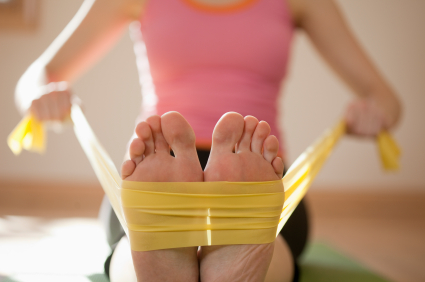- “I’ve had some pain in my right shoulder lately. It’s only when I raise it above my head and extend it to the rear. It’s a recurring injury that has never quite healed since 2009. I’ll just avoid that type of movement and try to strengthen the joint, being careful when I can.”
- “My right elbow sometimes hurts when I try to push a heavy door open with that arm. This is the only time I feel it so it’s probably not a big deal at all.”
- “My knee has been bothering me more lately, mainly when I walk up and down stairs. I’ve had problems with it in the past, usually after a long run or an intense basketball game. I did play basketball a few weeks ago and that’s when it started hurting. I’ll go lighter on the squats and leg exercises for a while.”
- “I’ve been attending a new boot camp three days a week. It’s all indoors and this is a good opportunity to workout in my Vibram Five Finger shoes to develop some of the muscles in my feet. Now I’m starting to have pain on the inside of my left ankle. I’ll back off to two boot camp sessions per week.”
Does any of this sound familiar? They are very familiar to me because they are real life complaints that I personally have right now. Why is it that we don’t give these “nagging injuries” the attention they deserve?
First, we hesitate to use the word “injury” to describe minor annoyances. They may not fall into the category of broken bones, fractures, or sprained ankles, but they are injuries nonetheless and they should be treated as such. Injuries, no matter how severe, need to be properly cared for. For minor injuries, treatment may simply mean giving your body time to heal.
The number one predictor for an injury is having had a previous injury in or near the same part of the body. This is because many times, we don’t give our bodies a chance to fully recover. We may not want to sacrifice a day at the gym because we feel like we must do something. It’s important to remember that rest and recovery are each something.
Minor complaints are injuries, and they’re your body’s way of telling you something is wrong. Our limbs, joints, and muscles rarely work in isolation during the activities of daily life. The body works as a unit and will compensate for lack of strength and stability in one area by placing more stress on another area.
The takeaways: If you’re injured, give your body some rest. If you have multiple minor injuries, this may be due to overtraining (and the chances of this increase with age). Explore ways to stay fit while giving the injured area time to heal (upper body workouts if there are nagging lower body injuries, for example). Finally, realize that rest and recovery are just as important as that last set of squats. Incorporate down time into your workout regimen. I vow to take my own advice over the coming weeks and get some much needed rest!
 How To Eat Healthy Without Breaking the Bank
How To Eat Healthy Without Breaking the Bank